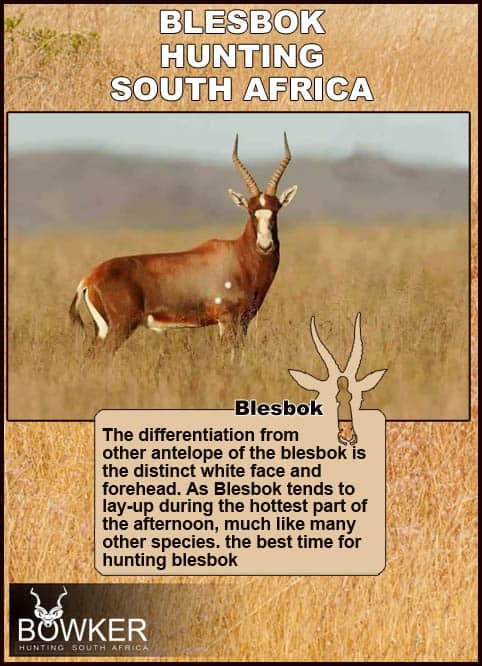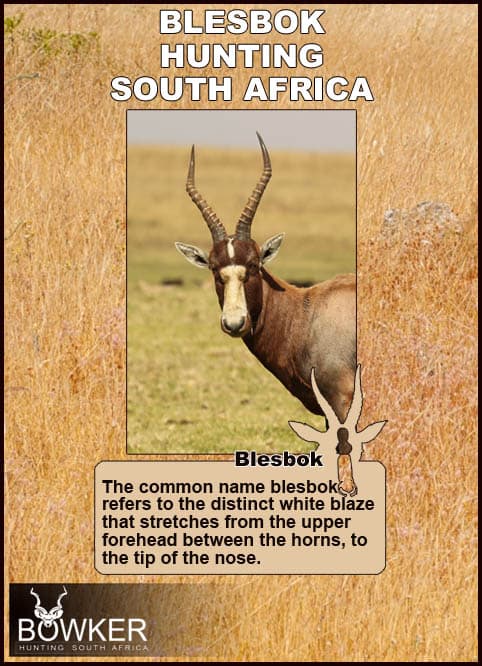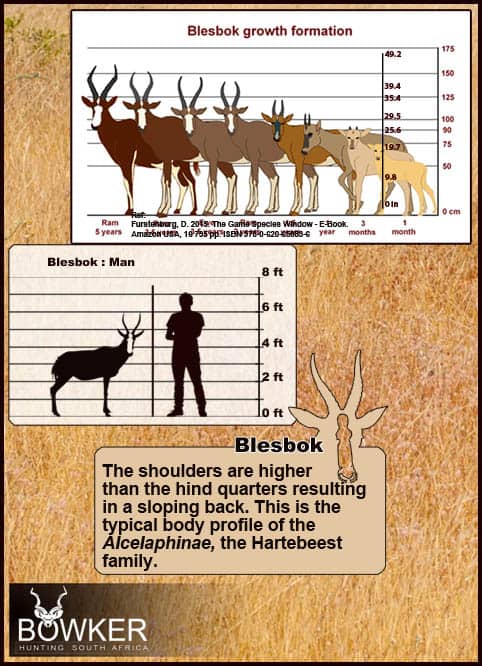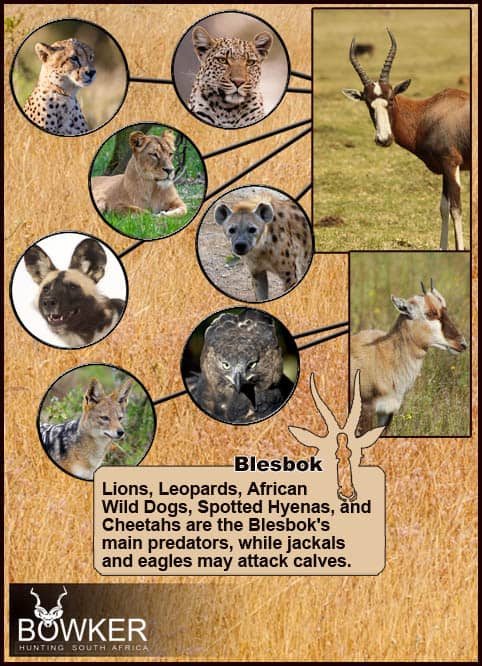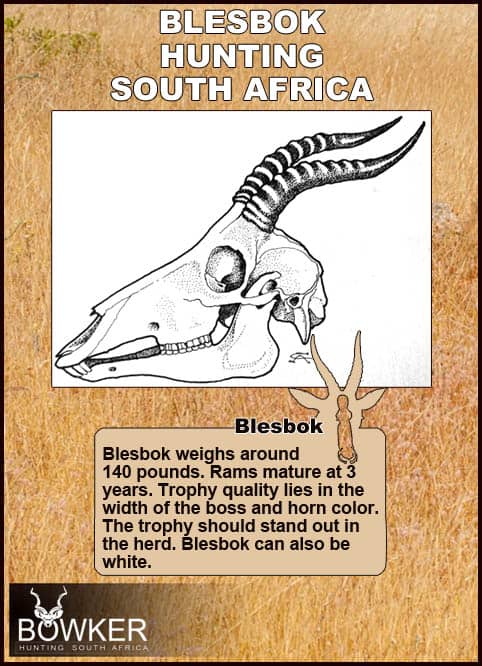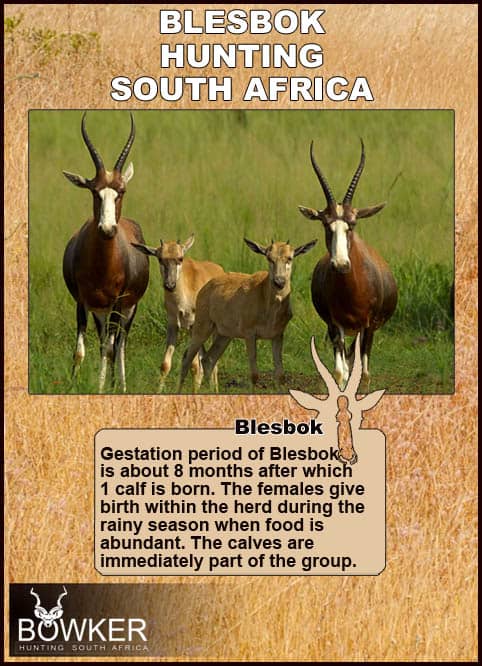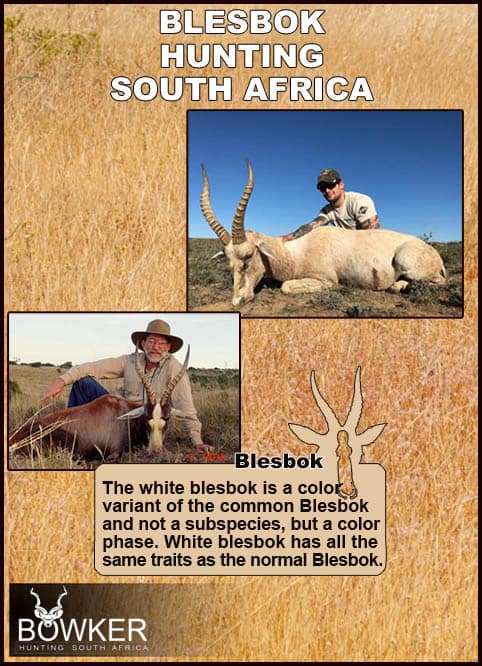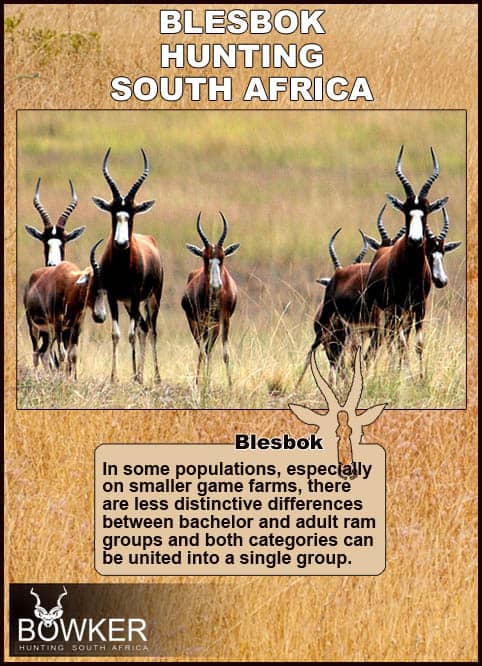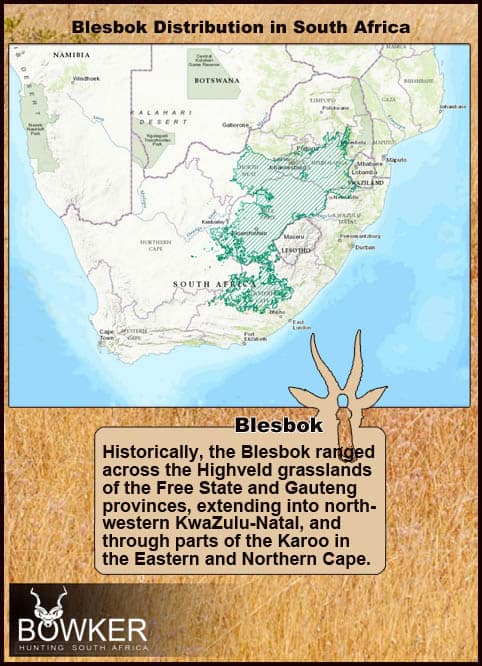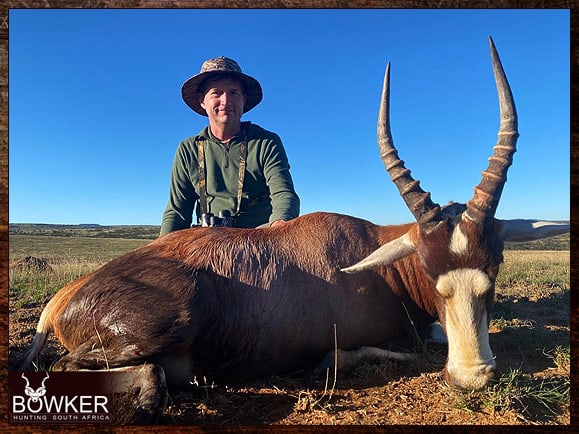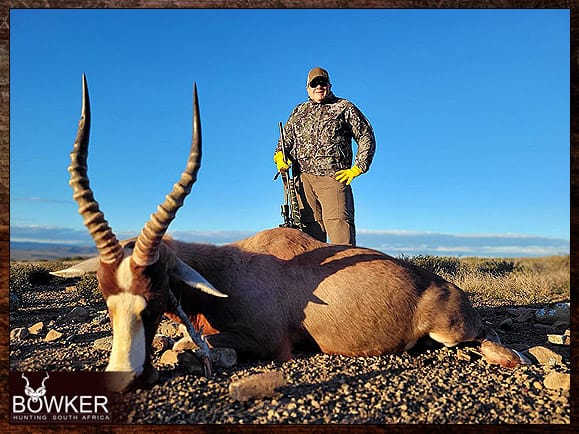
Summary
Blesbok hunting is the perfect trophy for the first-time hunter in Africa.
Shooting distances are longer on the open plains for blesbok hunters.
Once near extinction, this antelope has been reintroduced. Southern Africa’s game farms boast a population in the hundreds of thousands.
There are no seasonal restrictions on trophy blesbok hunts in the Eastern Cape.
Nick Bowker Hunting offers white and common Blesbok trophy hunts year-round.
Join us for a safari at Hopewell Lodge.
Table of Contents
Trophy Fees in South Africa -2025
The average price of a Blesbok is $450. Hunting safari packages often include a Blesbok.
The Blesbok Slam is also an excellent addition to any package, including the common and white Blesbok.
Our 2025 prices for Blesbok are as follows.
- $450 Common Blesbok Trophy Cost
- $650 White Blesbok Trophy Cost
All-Inclusive $5500 Starter Plains Game Package for seven trophies and eight days hunting.
- Kudu
- Black Wildebeest
- Impala
- Springbok
- Blesbok
- Warthog
- Mountain Reedbuck
Included in the Blesbok hunt package is a licensed hunting guide. As well as a hunting license and all permits. Bow hunting blesbok can be extremely difficult.
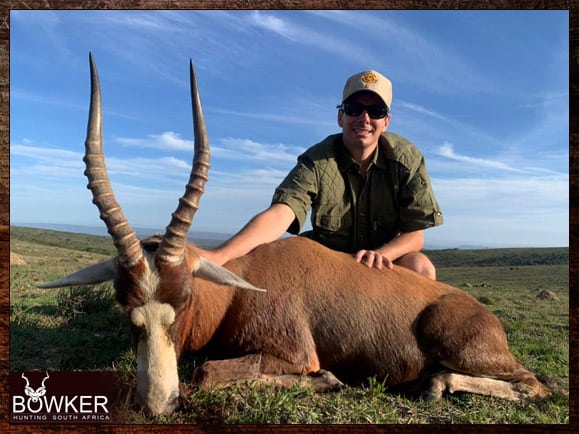
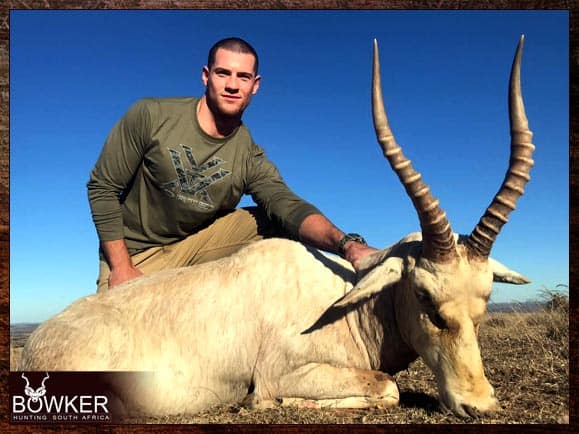
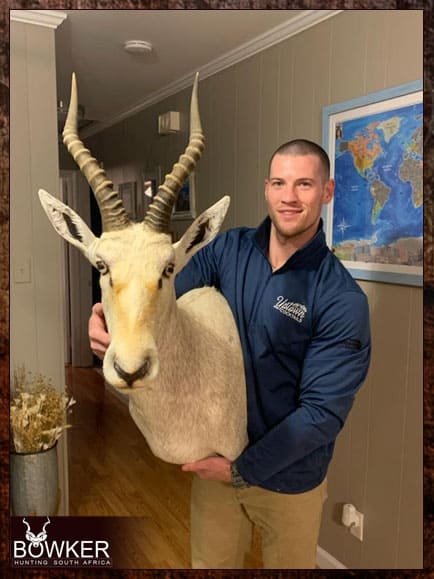
Blesbok Hunting
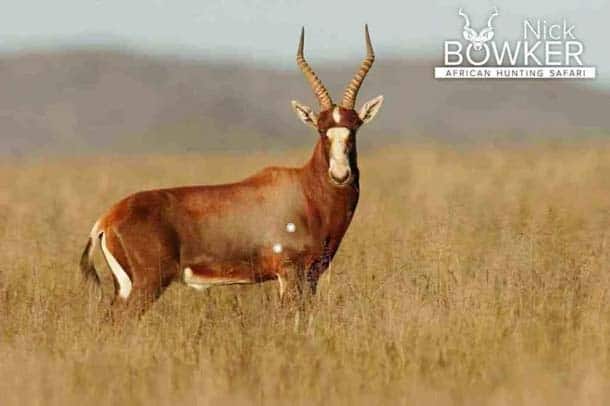
Shot placement must be in the bottom third of the animal directly above the front shoulder. This will ensure a heart or lung shot. Avoid head and neck shots, which are high-risk.
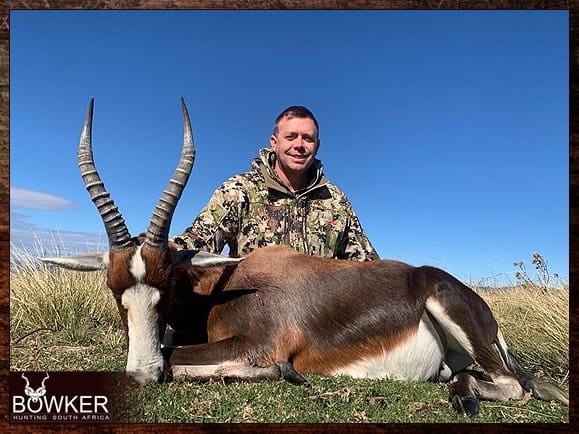
Your Blesbuck ram trophy should have an average shoulder height of around 35 inches, weigh 130 pounds, and have a Horn Length of approximately 13 – 15 inches.
The Safari Club International minimum score for a common blesbok is 40, and a white blesbok is 39. Measure the length of each horn and the circumference of the bases and sum the measurements to get your SCI score.
This once near-extinct game antelope has been reintroduced across South Africa and boasts hundreds of thousands.
Blesbok live on the open savanna and are primarily grazers. They form a herd consisting of females (ewes) and juveniles. Males (rams) tend to be solitary.
This changes when single males are disturbed during hunting. As a result, ensure that you take the animal of choice when blesbuck hunting.
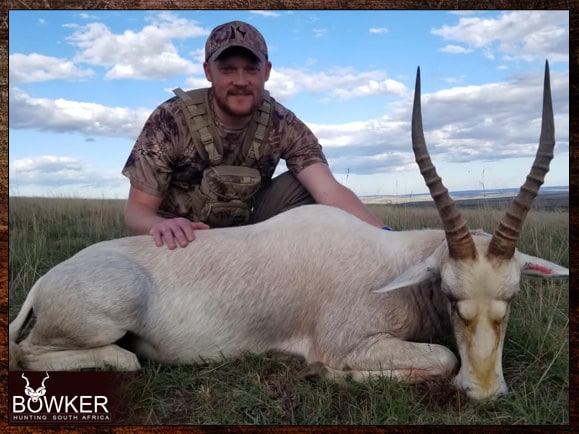
As available water is essential to this species, hunting near the approaches to water holes can prove productive.
The best time for hunting blesbok is when they are grazing in the morning or late afternoon.
Like many other species, the blesbok lays up during the hottest afternoon.
Nick Bowker Hunting has two large herds of Blesbok, well over a hundred strong, including white Blesbok mixed with common Blesbok.
The Blesbok is very wary and difficult to approach. Longer shots will, therefore, be required. This may be one of the few times you will shoot prone.
Blesbok, however, bunch together, and shooting the right one requires careful communication with your professional hunter, Nick Bowker. Hunt blesbok by setting up ambushes, looking down valleys, and spotting and stalking.
Trophy Judgement and Rifle Caliber for Hunting
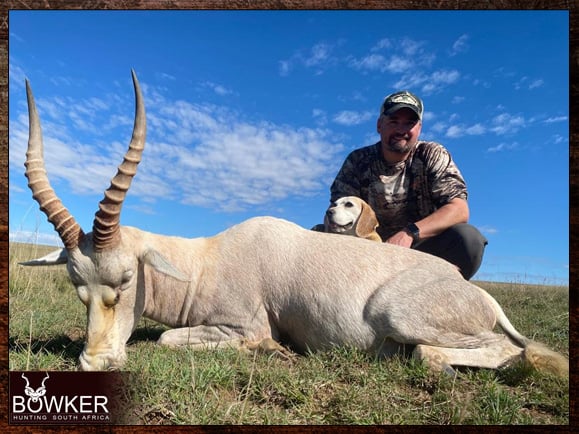
Distances are longer on the open grasslands, the Blesbok’s home, and we recommend the flat shooting 7mm magnums or even the 300 magnums for hunts.
For those hunters who wish to avoid going through the red tape of bringing a rifle into South Africa, Nick Bowker has a 300 magnums fitted with suppressors.
Mounted on the rifles are Swarovski Z8 tactical scopes. We have hand-loaded Hornady ELD-X ammunition. The rifle, including ammunition, is free of charge as part of all hunting packages.
The Blesbok is one of the fastest-breeding game species in Southern Africa. He is seen by many as the perfect animal for the first-time hunter in Africa.
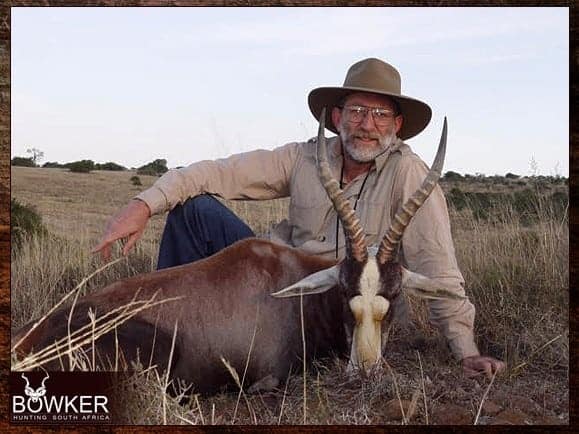
When judging the trophy quality of Common Blesbok, it’s essential to look at the width of the boss, the color of the horn, and the overall length.
Mature males will likely have a whitish tinge about two-thirds of the way up the horn, While females and younger rams have much darker horns.
The neck should be pronounced and stand out against females and young rams.
Also, mature rams will stand out in the herd and be more visible in horn length and shoulder height. The difficulty comes when approaching solitary rams, where you will rely on your professional hunter.
Difference Between a Male and Female
Male Blesbok has thicker and heavier horns than female.


Interesting Facts for Game Hunting
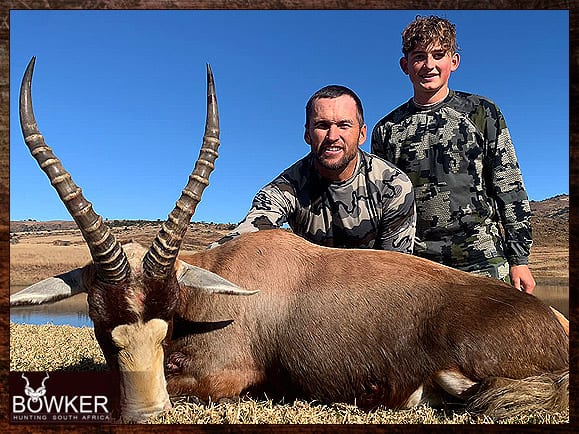
- The name “blesbok” comes from the Afrikaans word “bles,” which means “blaze,” which refers to the white-colored marking on the face of the blesbok.
- In English, they are called blesbuck, alternatively common or white blesbuck. This animal is plentiful in both national parks and private land.
- Blesbok has a medium-sized body and short tail, which ends with a black tuft.
- Males and females have S-shaped, spiral horns that can reach 14 to 20 inches in length, but females have more slender horns.
- Blesbok can run 43 miles per hour to avoid predators, including cheetahs, leopards, lions, jackals, wild dogs, pythons, and eagles.
- Blesbok lives in herds that consist of 10 to 100. Mature males protect females and lambs in the group, and the herd inhabits a territory of 2 to 6 acres.
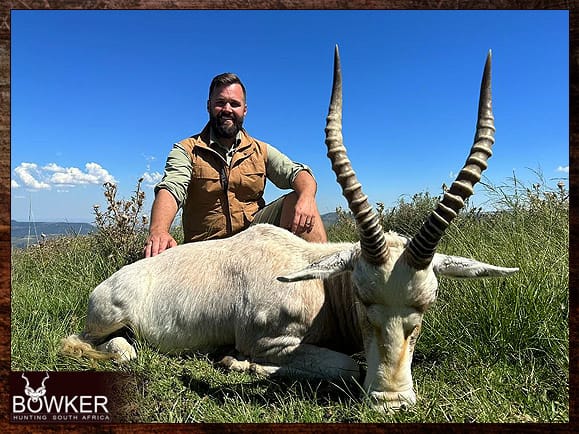
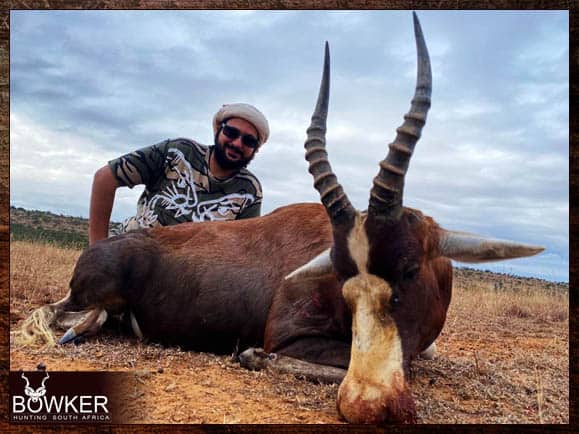
- Blesbok hunts are always done in the open, especially in the Free State. Male blesbok use piles of dung to mark their territory. The mating season of blesbok takes place from March to May.
- Blesbok can interbreed with a closely related antelope species called bontebok and create hybrids known as “bontebles.”
- Female pregnancy lasts about 7.5 to 8 months, after which a single calf is born.
- Females give birth within the herd, and the young immediately become part of the herd, which is different from many other antelope.
- Blesbok is born during November and December, the rainy season when food is abundant. The calf is beige-colored, and the “blaze” is dark-colored.
- Sexual maturity is at the age of 2.5 year, and can survive around seventeen years in the wild.
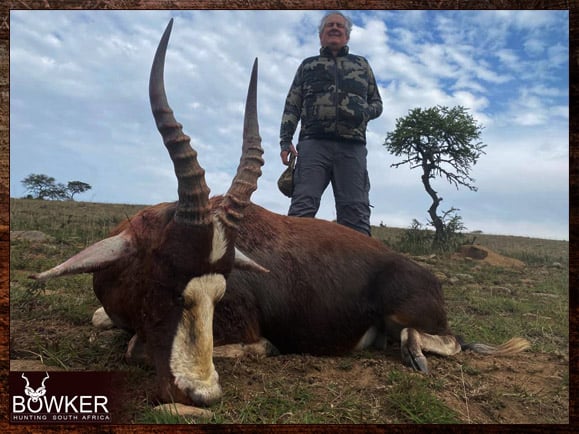
About the Blesbuck for Hunters
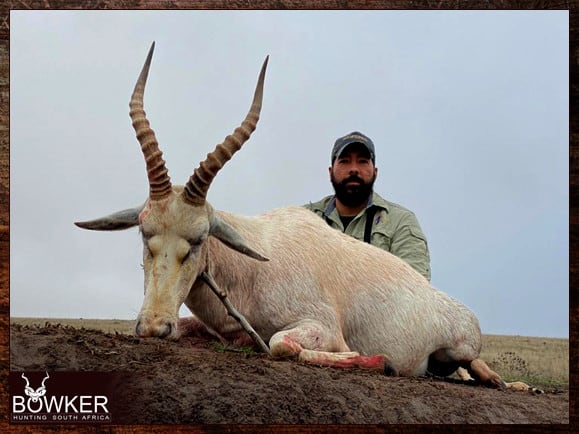
Found in the open veld and savanna of South Africa, Blesbok’s preferred habitat is open grassland with water.
Physically, rams and ewes are remarkably similar, with a mass of as much as 150 pounds.
The Blesbok has a prominent white blaze on the face and a white patch on the forehead between the horns.
The body is brown with a lighter-colored saddle on the back and the rump an even lighter shade.
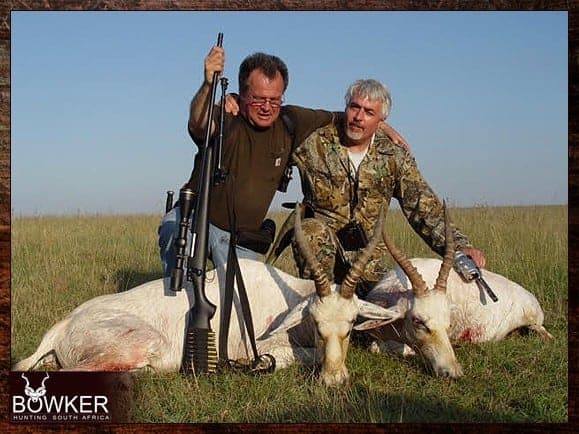
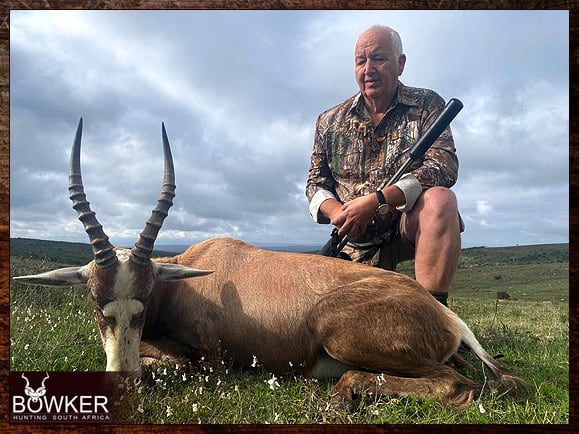
The legs are brown with a white patch behind the top part of the front legs, and the lower legs are whitish.
Both males and females carry horns ringed almost to the tip.
The Blesbok shares a common behavioral characteristic with his cousin, the bontebok, standing together with heads facing the sun and down towards the ground. He sometimes shakes his head violently, stamps, and runs in a complete circle, only to take up his original place.
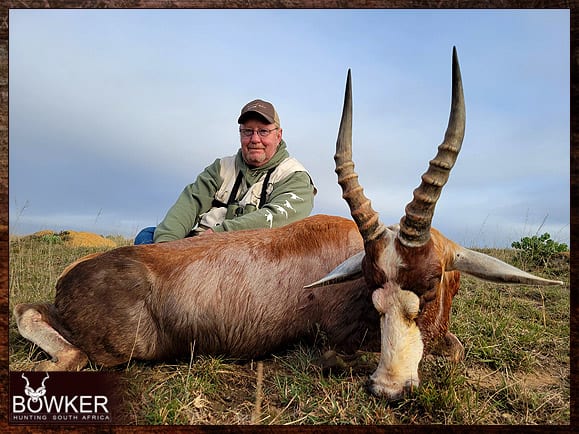
Frequently Asked Questions by Hunters
How much does it cost to hunt a Blesbok?
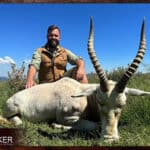
The trophy fee for a Blesbok hunt is between $300 – $600. Daily rates vary between $250 and $500 per day.
Included in the trophy fee is a licensed guide. As well as a hunting license and all permits.
A Blesbok is often included in a game package. Package prices vary from $3,000 to $10,000, depending on location and size. Packages include 5 – 7 trophy animals accommodation, meals, and daily rates.
How much is a White Blesbok?
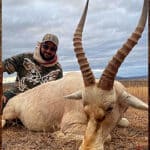
The trophy fee as a standalone White Blesbok hunt is between $600 – $900.
How to hunt Blesbok?
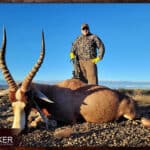
Blesbok is hunted on the open grasslands safari style. The Blesbok is wary and difficult to approach. Longer shots will be required.
Blesbok bunch together. Shooting the right one will need careful communication with your professional hunter.
Where do you shoot a Blesbok?
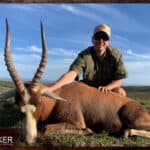
Shot placement must be in the bottom third of the animal directly above the front shoulder. This will ensure a heart or lung shot. Avoid head and neck shots, which are high-risk.
What is a trophy, Blesbok?
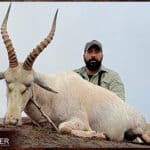
Blesbok trophies have a Horn Length of approximately 15 – 18 inches. The minimum qualification score under Safari Club International for a Blesbok is 40. Add the length of each horn and the circumference of the bases to get your SCI score.
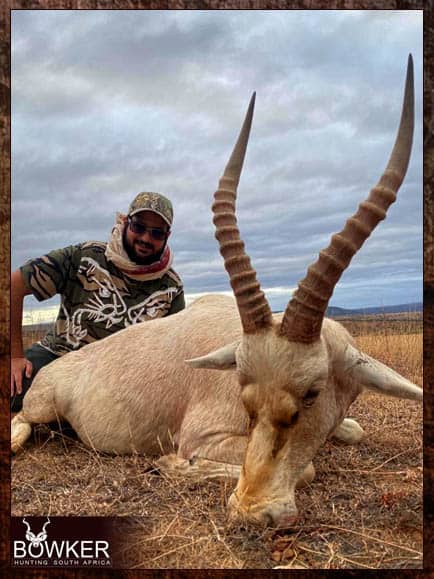
Seasonal Restrictions
When can you hunt Blesbok in South Africa?
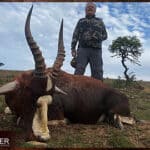
There are no seasonal restrictions on blesbok hunts in the Eastern Cape of South Africa for most outfitters.
How do you judge a Blesbok trophy?
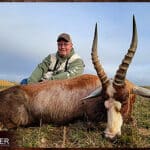
Mature males will likely have a whitish tinge about two-thirds of the way up the horn, While females and younger rams tend to have much darker horns.
Also, mature rams will stand out in the herd and be more visible in horn length and shoulder height. The difficulty comes when approaching solitary rams, where you will need to rely on your professional hunter.
What is the difference between a Blesbok and a Bontebok?
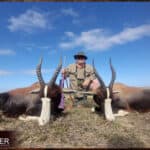
Bontebok is smaller, with the head flanks and upper legs having a purplish color. Other body parts are darker brown. In addition, the horns are black, while those of the Blesbok are more yellowish.
What Caliber is Recommended for Blesbok Hunts?
We recommend the flat shooting 300 Winchester or 7mm magnums with high-quality tactical scopes and a suppressor.
Difference between Bontebok and Blesbok
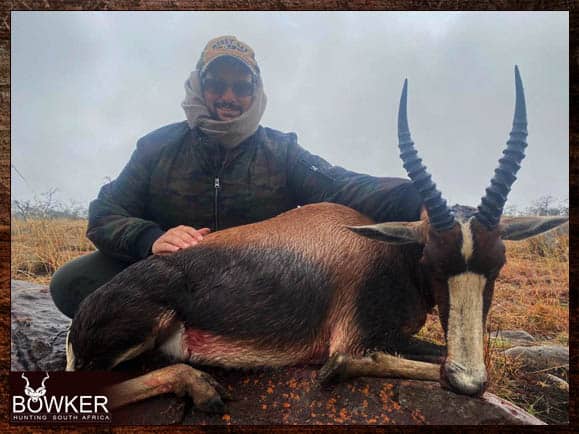
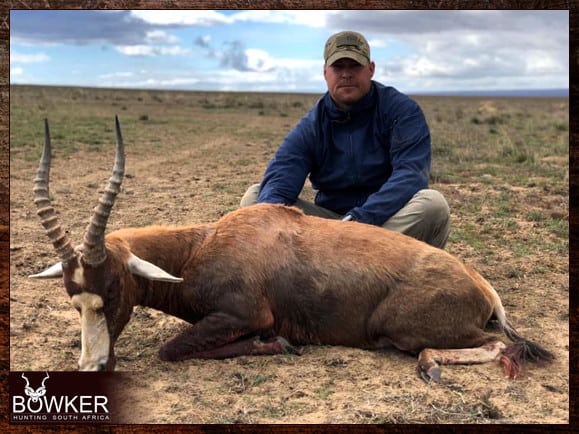
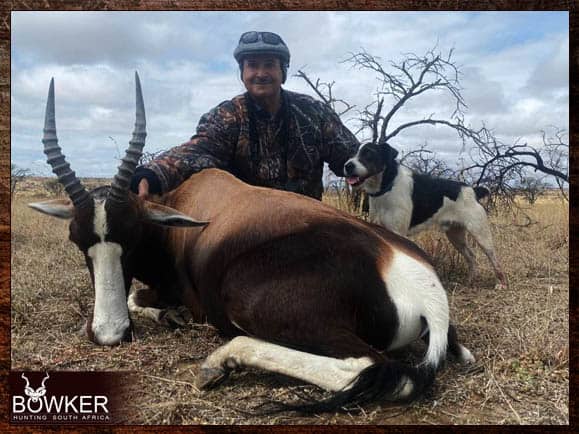

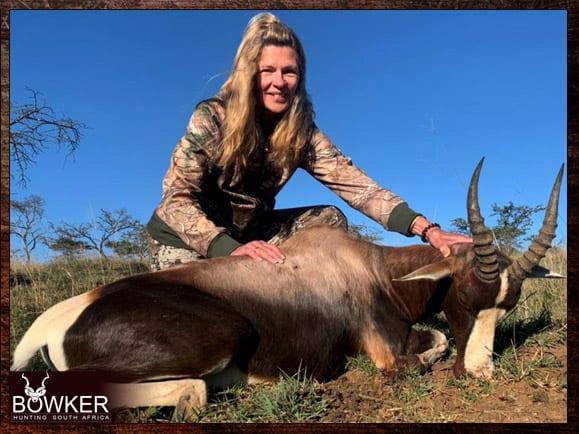

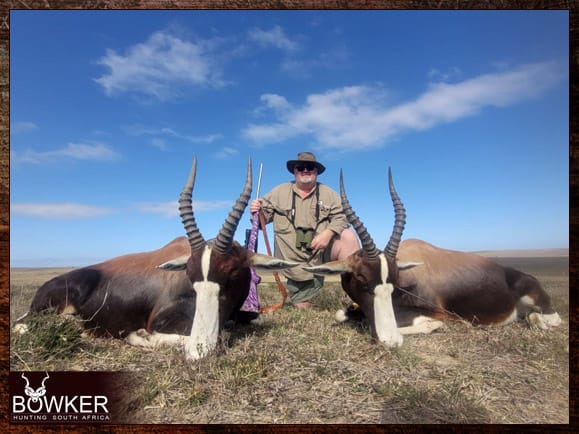
In Pictures
